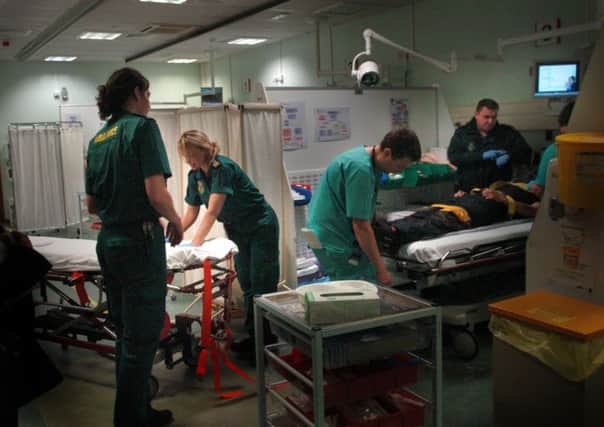Lancashire hospitals’ ‘Mad Friday’ nightmare


Staff at Accident and Emergency departments across the county, already struggling to cope with a seasonal increase in cases, fear a flood of extra patients over the festive period could push them close to breaking point.
And ambulance crews, who have been battling to reach many 999 call-outs in their target time over the past few months, are expecting things to get even worse as revellers finish work and start partying.
Advertisement
Hide AdAdvertisement
Hide AdHospital bosses have admitted they are facing huge ‘pressures and challenges’ at their A&E departments and have revealed they are admitting more people than they have room for – which is leading to delays.
There have been claims that ambulances are queuing for up to two hours to hand over patients – taking them off the road for long periods.
But hospital bosses today said they wanted it to make it ‘completley clear’ they are not making patients wait in ambulances until there are beds available.
To cope with the demand, Lancashire Teaching Hospitals Trust, which runs the Royal Preston Hospital and Chorley and South Ribble Hospital, has postponed training to release doctors to undertake extra ward rounds, and nurses and education staff to provide additional support to ward teams.
Advertisement
Hide AdAdvertisement
Hide AdThe demand is such that hospital chiefs predict its A&E departments will see 700 more people this month that last December.
The news comes just days after an 80-year-old woman was left lying in a cold and wet street for an hour before an ambulance could reach her – and that was during the day.
Jean Swindlehurst slipped and fell while out shopping in Bamber Bridge and relatives claim they were told the delay in getting her to hospital was purely down to crews having to queue at the Royal Preston Hospital A&E department before they could hand over patients to nursing staff.
“We were told there was hardly an ambulance available in Lancashire at the time,” said her son-in-law Mick Reynolds. “Hospitals are full and ambulances are having to wait outside for up to two hours before they can hand over patients. You can see the frustration on the faces of the poor ambulance crews. They are stretched to the limit. We had to wait for an hour. A fast responder arrived reasonably quickly, but it was a full 60 minutes before the ambulance could get to us.
Advertisement
Hide AdAdvertisement
Hide Ad“My mother-in-law was in great pain and was laid in the street.”
Karen Partington, chief executive of Lancashire Teaching Hospitals NHS Foundation Trust said: “There is no denying the hospitals are busy. We hope patients and their families can see that all of our staff are absolutely committed to making sure anyone who requires urgent treatment is admitted to hospital promptly, and that every patient receives the standard of care they deserve.”
The Trust says it has reached its highest ever activity levels with the volume of 999 calls rising to an average of over 4,000 per day.
This is expected to be maintained throughout the festive period, particularly tonight, when Christmas party season peaks.
Advertisement
Hide AdAdvertisement
Hide Ad“The NHS has good plans in place to make sure patients receive high standards of care during winter, which tends to be busier than the rest of the year for health services. However this winter is already proving to be exceptionally busy. Across the country there has been an unprecedented rise in 999 calls, and a significant increase in both the number of patients attending A&E, and emergency hospital admissions.
“Here in our hospitals we are predicting that our Emergency Departments will see 700 more people this month than last December. From the beginning of December we have also admitted many more patients with emergency conditions than any week so far this year. Many of the patients admitted as an emergency have several conditions, or serious illnesses, which means they need to stay in hospital for longer. In recent months the number of nursing home beds in the local area has reduced by more than 200, which is causing delays in discharging patients who have ongoing care needs but who no longer require the specialist services only a hospital can provide.
“Together these factors have resulted in capacity pressures within our hospitals. I would like to assure our patients that despite these ongoing pressures and challenges we are doing everything possible to deliver the highest standards of care.
“We are working with our colleagues in North West Ambulance Service to make sure our Emergency Department is able to promptly release paramedics to attend other calls.”
Advertisement
Hide AdAdvertisement
Hide AdNorth West Ambulance Service director of operations, Derek Cartwright, explained: “The rise in activity we are seeing in the North West region is being replicated all across the country, with many services stating that this is the busiest time they have ever experienced.”
Meanwhile Jan Ledward, Chief Officer of Greater Preston clinical commissioning group added: “We know that winter usually brings added pressure to nearly every part of the NHS. Locally there have been three nursing homes that have been suspended, and so were not accepting new admissions, in order to ensure the quality of care to the remaining residents. At the peak of this there were 50 unused beds. Our Quality and Safety team and partner organisations have been working closely with the owners and staff of the homes, and one is now fully reopened and is accepting new admissions. We are actively working with the two other homes.
“We have prioritised increasing patients’ access to alternatives to hospital with initiatives such as extending GP surgery opening hours, the development of Integrated Neighbourhood Teams and generally supporting people with long term conditions to help them remain at home and out of hospital.”